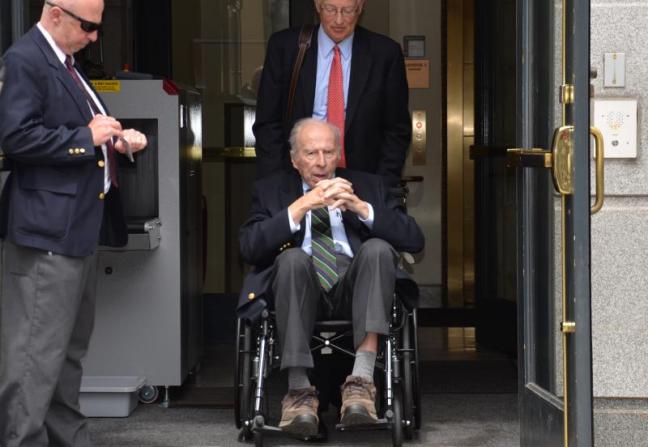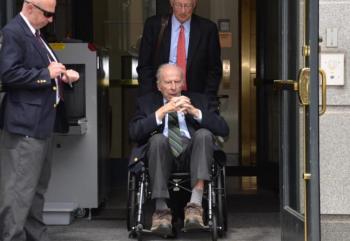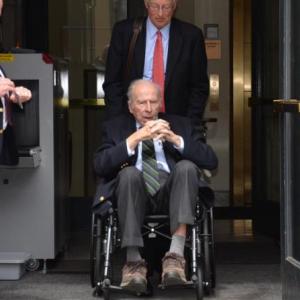After four years in prison, Rusty Brace is released
ROCHESTER, MINNESOTA — Four years following his sentencing in U.S. First District Court in Portland for mail and tax fraud, former Rockport resident Russell “Rusty” Bruce was released April 26 from a federal penitentiary in Rochester, Minnesota. At age 85, he looks ahead to two years of supervised release with the United States Probation and Pretrial Services, whose Maine office is in Bangor.
Brace was sentenced in 2015 to federal prison after pleading guilty to three felony charges: mail fraud affecting a financial institution, and two tax frauds that include making false statements to the Internal Revenue Service.
Working over the winter of 2015, the Federal Bureau of Investigations and Internal Revenue Service investigators determined that Brace had moved more than $4.6 million over the course of 16 years into his account, money that had been donated by community members to UMCC for distribution to other Midcoast charities serving the needy and poor.
After the investigations, prosecution by the U.S. Attorney’s Office in Portland, and incarceration with the Federal Bureau of Prisons, Brace is now to be released to the U.S. Probation and Pretrial Services.
This supervised release comes with a list of conditions, as written by U.S. District Court Judge George Singal, in 2015.
“Our job is to enforce the court order,” said Deputy Chief Probation Officer Michael Penders, for the District of Maine.
“Individuals under supervision (probation or supervised release) are assigned to a Probation Officer,” according to the U.S. Probation and Pretrial Services. “This officer is responsible for monitoring offenders and ensuring they comply with the conditions ordered by the Court.”
Penders declined to discuss where Brace will be living, other than it will be in Maine.
Release conditions for Brace include that he possess no firearms nor dangerous weapons, cooperate with DNA collection, not leave the judicial district of the court or probation officer, and follow the standard conditions of supervision as noted by the court.
Special conditions of release include that he provide the supervising officer with any requested financial information; and report to the supervising officer any financial gains, including income tax refunds, lottery winnings, inheritances, and judgements, whether expected or unexpected.
“Defendant shall apply them to any outstanding court-ordered financial obligations,” the 2015 court sentencing document said.
Additionally, Brace is to “satisfy all tax liabilities” to the IRS, and to participate in mental health treatment, until released by the supervising officer.
“Defendant shall pay/co-pay for services during such treatment, to the supervising officer’s satisfaction,” the court said.
All those conditions were delivered as Brace sat before U.S. District Court Judge George Singal on Oct. 9, 2015 in a federal courtroom in Portland.
Brace’s case had stirred the Midcoast as the FBI investigation first unfolded, only to be followed by lawsuits and his ultimate conviction.
In the words of the U.S. Attorney’s Office, District of Maine, Brace, “pleaded guilty to mail and tax fraud on May 29, 2015. According to court documents, between about July 1999 and Sept. 25, 2014, Brace, the president and director of United Mid-Coast Charities, Inc., fraudulently obtained $4,646,636 by claiming that monies donated to UMCC, would be used for UMCC’s charitable purposes and not diverted for the defendant’s personal expenses or benefit. In fact, Brace diverted the funds into his own accounts and used them for his benefit and to pay personal expenses. To execute the scheme, he used the U.S. Postal Service to mail donation request letters, UMCC brochures, self-mailer remittance envelopes and thank-you letters. Brace failed to report the money he obtained as income on annual federal tax returns thus failing to pay almost $390,000 in taxes. He also filed false nonprofit income tax returns for UMCC in which he failed to disclose the funds he illegally obtained.”
After his sentencing, Brace then reported to prison in November 2015, and was transferred later from a Connecticut prison to the Rochester, Minnesota, prison, which has a health care center.
On Sunday, April 28, 2019, Brace will be released, according to the Bureau of Prisons.
The U.S. Attorney’s Office had prosecuted Brace for mail fraud against a financial institution, tax fraud and false statements and still monitors the $3,617,475.45 in restitution that Brace was ordered to pay.
“Typically, that information is not made public by the U.S. Attorney’s Office unless it is disclosed as part of a post-sentencing court proceeding.” said Assistant U.S. Attorney Donald E. Clark, who is spokesman for the District of Maine.
At his 2015 sentencing hearing, the judge ordered Brace to serve four years of prison and to pay restitution, most of which eventually made its way back to UMC.
The $3.6 million he was to repay included:
$2,167,474 to United Midcoast Charities
$219,269 to the Crime Victims Fund
$1,230,730 to Travelers Casualty and Surety Company.
By 2018, UMC had seen approximately $2.7 million returned through the sale of real estate properties. They included.
• 21 Elm St., Camden, an office building assessed then by the town at $1.7 million. The building had been listed at $2.3 million. It sold in 2015 for $1.3 million.
• 39 Spruce St., Rockport, a house and land assessed at $774,800; the house was on the market at $895.000. It sold in 2017 for $572,000.
• House and land at 51 Alpine Way in Rangeley, with assessed value approximately $290,000. The house was on the market for $399,800. It sold for $229,000.
The restitution ordered by the judge to Traveler’s Insurance also wound its way back to UMC through a bank settlement.
And while Brace was in prison, a check arrived periodically to the UMC post office box from the federal prison in Minnesota.
Generally amounting to $25, the checks represented compensation for the work Brace did in prison.
The money went back into UMC’s funds to promote the welfare of Knox and Waldo county residents, according to UMC.
Reach Editorial Director Lynda Clancy at lyndaclancy@penbaypilot.com; 207-706-6657
Event Date
Address
United States





























